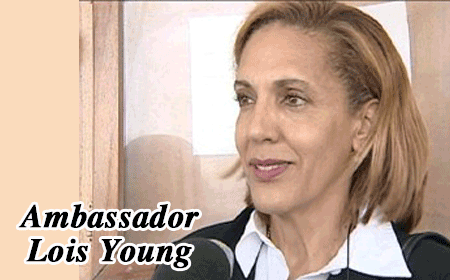BELIZE CITY, Tues. July 2, 2019– Belize’s permanent representative to the United Nations, Ambassador Lois Young,has taken an activist position in speaking up on behalf of small nation-states whose contribution to the global phenomenon described by scientists as global warming, is minimal.
In an opinion article published in the Financial Times about the dismissive approach being adopted by of some of the large nation states, Ambassador Young called on them to step aside and stop blocking the UN efforts to contain global warming.
Under the caption, “Small nations like Belize are being sacrificed at climate talks,” Ambassador Young, who was in Bonn, Germany, attending UN climate talks that were attended by representatives of 200 countries, sounded a clear, ominous warning about the dangers facing the world if action is not taken.
Ambassador Young is also the chairperson for the 44-member state, Alliance of Small Island states (AOSIS). The UN climate talks were “aimed at implementing the 2015 Paris Agreement, which seeks to keep the average global temperature increase below 2C,” Ambassador Young writes.
Ambassador Young said that, “All these countries agreed in 2015 to that deal, and yet here — nearly five years on — there are a few who wish to quietly use procedural measures to rip it up away from the public gaze.
“The science is important because it illustrates just how fine a line we are now treading. Last year’s special report by the Intergovernmental Panel on Climate Change lays out the stark and bleak realities of a warming world.”
Ambassador Young said that even if we keep an average temperature increase to 1.5 C, there will still be an economic impact, global crop failures and “brutal damage to coral reefs.”
“The Intergovernmental Panel on Climate Change(IPCC) work had global input: the US, Saudi Arabia, India and China all contributed to the report, alongside the EU, Africa, Latin America and my small island colleagues,” Ambassador Young said.
Belize’s Ambassador took the major oil, gas and coal-producing countries’ envoys to task for not planning a low carbon future, “saying they reject that science.”
“They obviously believe that with the current instability in the world, no one would notice, and no one would care if they tried to exorcise the IPCC conclusions on 1.5C warming from UN climate talks and take it off the agenda,” Ambassador Young writes.
Noting that this position is coming days before the G20 in Osaka, Ambassador Young concludes, “The move essentially declares that small islands and low-lying coastal developing states like my home, Belize, are disposable global zones to be sacrificed amid unprecedented climate change.
“Their refusal to formally consider the IPCC report, which was established as a critical next step in the Paris Agreement, undermines the basis on which the community of nations engages on and responds to climate change-induced challenges. It is a rejection of multilateralism and the 1990 UN climate framework, which was originally agreed by a Republican US president, George H W Bush, in a more hopeful era when we envisaged the start of a new history.”
Ambassador Young went on to sound a clear warning that if we had time to waste and the science was unclear, “perhaps this refusal to accept the conclusions of the report would not be such a problem. We could sit down, negotiate and eventually move on.” She stated that, on the contrary, however, “We do not have time, and the science is stark. With only a decade in which to act decisively, a small yet vocal contingent of states — some of which have historical responsibility for excessive emissions and a commitment to protecting vested interests — is effectively scuttling global efforts to secure a safe future.
“Do the world leaders really mean to tell us, the most vulnerable nations on the planet, that this is the new reality we must accept? This is an emergency and we will stand up and fight for what we know is right. Our alliance is firm. The time for climate denial and incremental action is long over. This is a crisis that affects our security, and we call on those blocking at the UN to step aside.”
On June 1, 2017, the United States administration of President Donald Trump announced that the US would withdraw from the Paris Climate Change Accord that the US signed onto in 2015 during the administration of President Barack Obama.
Since the US administration made that announcement, the Congress, controlled by the Democrats, passed its Climate Change Now bill, as a symbolic signal to the Trump Administration to get back on track and honor its commitment to the Paris Climate Change Accord.
The Trump White House and the Republicans, however, have been dismissive of the Democrats’ bill; the Republican Senate Majority Leader described the bill as “political theater,” while the White House said it would be inconsistent with the president’s “America First” agenda.
Under the Paris Accord, the US withdrawal would come into effect in November 2020, when the US presidential election is scheduled.
In the 2015 Paris Accords, the US had pledged to cut greenhouse gas emissions by 25 percent by the year 2025.

